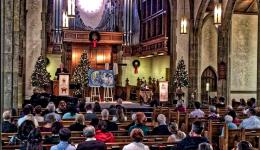Category:
ENHANCING WORSHIP
1. Plan well ahead. To do it right, or better, you'll need more preparation time.
2. Gather a Worship Team. Include those who love music, or art, or computer technology, or are gifted in wordsmith-ing (without dumbing down content), or can see the parts and pieces as well as the overall intent, and that includes the pastor or worship pastor.
3. Stay Close to the Scriptural Theme of the Day. Let all be done as subject to the Word (theme, church year, life as it happens – e.g. Katrina, 9/11, Haiti – ‘is there any Word from the Lord?').
4. Draw from riches of the past, as well as aware of the present and looking to the future, above all: immersed in God’s Word and God’s Story. Borrow from all sources as appropriate. Rediscover ancient prayers (Sarum Rite; Book of Common Prayer, Celtic or Orthodox Prayers) and the various musical expressions of the ages.
5. Remember that the Story, like a tree is still growing and as a stream is still flowing. In worship, enter in yourself as a leader and it will bring others with you.
6. Think about individuals. In terms of needs, in terms of generations, individual stories, cultures, experiences, backgrounds, but then draw them together in concert. A band has a percussion section, a wind-instrument section, a brass-instrument section. They’re all playing the same piece (one hopes), not necessarily on the same page (as some are counting the bars waiting for their place to enter again upon the music). But each is unique, different, varied. What a bassoon can do and oboe can’t, and vice versa. And likewise contrast clarinet from bongo drum, tuba from French horn, xylophone from trumpet, snare drum from violin. If the whole concert was from 55 tubas, would you attend? Some are solo instruments; others are giving beat, rhythm and though they may have an extended spotlight time everyone knows we will get back to the melody line and from those instruments who task it is to keep the theme ever before us.
7. Think of the corporate gathering; not just of the individuals gathered. In our overly individualistic, me-centered, narcissistic Western worship (in ‘what I like’ instrument in delivery and content), we need corrective. The Scriptures see things whole more than do we. Many (most?) of the NT epistles are written to you (plural) meaning the Church, the whole People of God, or the community gathered in particular times, places, communities of the day. We read the you (as singular) wanting our own private word of devotion, guidance, encouragement and care.
The best ancient hymns were about ‘we’ not about ‘I.’ It is the gathered community that counts more as the ecclesia of God comes together. We are called away again and called into such gathering with such worship. It is not my preferences but ‘each other’s needs) that we would prefer at such times . And again, ultimately, it’s not about us; it’s about God as He gathers among His People, by His Spirit, the Spirit of the risen Christ. ‘Come Lord Jesus: Maranatha.’ We need worship songs and new hymns that talk, that lead us together, that are more about the common-wealth of concern of discipleship of concerted worship, action, mission and praise.
8. Help people develop their unique instrument of praise, their whole body, soul, mind and spirit. As part of the church’s mission, part of the nurture and development of its children and youth, part of its affirmation of God’s creation, part of the development enhancement of spiritual gift and creative talent, might a church budget for, or ask for bursaries or other contributions from wealthier congregants, to enable basic lessons to be provided (perhaps both for children, youthand adults of the wider community as well as for congregant children and members). Art lessons, music lessons (insert instrument name here), dance or drama lessons might be considered. Perhaps times of quilting and banner-making could be resurrected once again.
9. Make space (and show interest and appreciation) in allowing for the catalytic stimulus and influence on others (of the community or fromwithout) in holding events that focus on a variety of talents and expressions of Christian praise; or in regard to certain focused aspects of response and offering: art nights, music nights, talent nights. Where space and architecture permits add art and banner and icon and glass and structure that expresses the worship of individuals and groups of talented people – all with J.S Bach intent (sola Dei gloria) included: ‘solely for the glory of God.’
10. Use your whole palette by including where possible, in the service, or over weeks and months, a variety of instruments and media expressions –both in the worship ‘service’ and also in the worship ‘space’ of God’s People. If the ‘earth is the Lord’s and the fullness thereof’ let’s note the difference between what is worldly and fleshly and thus to be renounced and let go, and God’s good and creaturely gifts that are to be used for His glory and for the good of our brothers and sisters, received with praise and thanksgiving and offered back as expression of our love.
11. Use time as a good steward. Don’t be afraid to suggest rather than rolling out the whole. Point to, use metaphor, type, parable that doesn’t have to explain everything ponderously as you proceed, but rather creates more through its littleness, weakness and first-thought obscurity than would happen by giving the whole load to every component part. Don’t use too much of any one colour or ingredient. Better too little than too much. Again, all that is added and contributed, however, should be fitting, helpful and to the point
12. Remember the Three-in-One reality of the Godhead. What in the Service reflects our Understanding of the Father, and the Son, and the Holy Spirit – as the Trinity? Without silo-ing the argument or ‘splitting’ the Godhead, does this gathering (think of church year, Scripture theme and purpose) lead us to augment, celebrate, learn about and give thanks for one aspect more than another?
13. Discover the variety of music expressions of the people gathered (thinking generationally as may be appropriate, and of those from other lands and cultures (all subject to the intent, theme, Word of/for the day)









